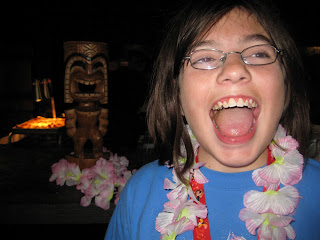Planning a trip to Disney World with your Aspie? Here are some helpful tips to make your trip more enjoyable!

--Take earplugs! Disney can be a noisy place...prevent a meltdown before one even starts. Our favorite brand? Mack's earplugs! They're reusable, too!
--Allow for some downtime each day. You can do this by going back to your resort to rest or swim, if you like. Or, you can find a quiet corner in the park you're visiting and just sit and relax. Maybe this would be a good time to have a snack!
--Avoid meltdowns! A hungry child needs to be fed. A tired child needs to rest or take a break. We've learned this the hard way! We told Sarah one day that we'd eat AFTER experiencing an attraction, but she wasn't able to comprehend that. She had a major meltdown and ran all the way back through the queue because she was hungry and thought she'd never get to eat again...big mistake on our part. Alan found her balled up in a corner outside the attraction, which was a scary moment for him. (Dads aren't generally as experienced with meltdowns as Moms are).
--Have a plan! Lots of Aspie kids do much better if they know the "schedule" for the day. Decide what attractions you're going to experience. Maybe make a list that your child can check off as you do each thing. Besides, if you don't have a plan, you'll waste a lot of time trying to decide what you're going to do next. If you can, schedule your vacation during "value" season...crowds (and costs) will be lower, which can make for a much more pleasant vacation. When planning your trip, take the weather into consideration. If your child doesn't do well in hot weather, don't go to Disney in the summer or early fall. Try visiting in November (not Thanksgiving week), early December (not during Christmas week), in January, or in May.
--Be flexible. Don't become such a commando tourist that you don't allow for changes in your plans. If your child wants to ride "The Great Movie Ride" 3 times in a row, allow for time to do that (yes, we've had to do that...it's one of Sarah's
favorite attractions!). This can also help avoid meltdowns.
--Make meal reservations ahead of time. If you don't, you run the risk of not being able to get into a table-service restaurant, or of having an extra-long wait time. Disney likes for whole parties to stay together while you wait to be seated, so you can't necessarily plan for Mom or Dad to take Junior on some attractions while waiting for your name to be called. Make sure you check menus ahead of time, too, so you know that your child will find something on the menu to eat. If your child is on a special diet, such as a GF/CF diet, let your travel agent or Disney Dining know at least a couple weeks before your vacation, so they can more
easily accomodate for your child.
--Prepare your child in advance for your trip. Let your child know he or she will have to wait in line sometimes (contact Disney to ask them about the Disability Access Service, or DAS). Show your child videos on YouTube of the various attractions, as well as character interactions, so he or she knows what to expect. Make a Social Story for your child about waiting in line for meals, attractions, bag check, etc. Discuss your trip, so your child knows what's going to happen during your vacation. Aspie kids don't like surprises!
--Avoid "losing" your child. Sarah had a real problem with wandering when she was younger. We called her "Houdini" because she disappeared every time we turned around. If your child is younger, keep him or her in a stroller, or on a leash, if necessary. People who have a problem with this don't have a child on the Spectrum. They'll get over it. Keep some kind of identification on your child, something that also has your name, cell phone number, and resort name on it. Teach your child where it is, so they can show it to a Cast Member if they get separated from you. There are some that attach to your child's shoe, so they can't lose it. If nothing else, write it on your child's arm or neck with a Sharpie. It will come off eventually ;) If you'd like to go high-tech, there are some GPS child-finding systems out on the market that are supposed to work well. Once your child is old enough, maybe invest in a cell-phone for the child (we got one for Sarah when she was 8). Then, if you can't find the child, you can call him or her, or they can call you. It was a lifesaver for us!
--Most of all, have fun! Disney is probably the most disability-friendly place to vacation! Again, check
here for information on Disney's Guest Assistance Card and other information about Disney and disabilities. We have found most Cast Members at Disney to be very understanding of Sarah and her "issues." Disney is one of the few places we can vacation as a "normal" family.
















